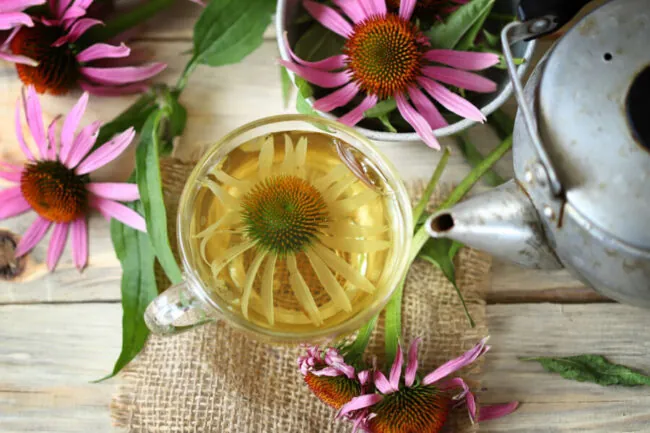Different Varieties of Echinacea and Their Properties
There are several species of echinacea, with the most commonly used being Echinacea purpurea, Echinacea angustifolia, and Echinacea pallida. Each species has unique properties:
- Echinacea purpurea: Known for its strong immune-boosting effects.
- Echinacea angustifolia: Often used for its potent anti-inflammatory and pain-relieving properties.
- Echinacea pallida: Less common but still valuable for its medicinal benefits.
Top 7 Benefits of Echinacea
Immune System Support and Boosting
Echinacea is best known for its ability to enhance the immune system. It stimulates the production of white blood cells, which are crucial for fighting infections.
Regular use of echinacea can reduce the likelihood of catching a cold or flu and help the body recover faster when sick.
Imagine getting through winter without the dreaded sniffles and coughs – that’s the power of echinacea!
Anti-inflammatory Properties
Inflammation is the body’s natural response to injury or infection, but chronic inflammation can lead to various health problems.
Echinacea contains compounds that can reduce inflammation, making it beneficial for conditions like arthritis. Whether you’re dealing with joint pain or muscle aches, echinacea can help ease the discomfort naturally.
Skin Health and Wound Healing
Echinacea’s antimicrobial and anti-inflammatory properties make it excellent for skin health.
It can be used to treat wounds, burns, and skin infections, promoting faster healing and reducing the risk of scarring.
Echinacea creams and ointments are popular for treating acne, eczema, and other skin conditions, leaving your skin looking and feeling healthier.
Antioxidant Benefits
Antioxidants are essential for protecting our cells from damage caused by free radicals.
Echinacea is rich in antioxidants like flavonoids, cichoric acid, and rosmarinic acid. These antioxidants help to neutralize free radicals, reducing oxidative stress and supporting overall health.
By incorporating echinacea into your routine, you’re giving your body a natural defense against the wear and tear of daily life.
Pain Relief Qualities
Echinacea has been traditionally used to relieve pain.
Its anti-inflammatory and analgesic properties can help reduce pain and swelling associated with conditions like headaches, sore throats, and toothaches.
Next time you’re in pain, consider reaching for an echinacea supplement or tincture for natural relief.
Anxiety Reduction Effects
In today’s fast-paced world, anxiety is a common issue. Echinacea may offer some relief thanks to its calming properties.
Certain compounds in echinacea can help regulate synapses and neurotransmitters in the brain, potentially reducing feelings of anxiety and promoting a sense of calm.
It’s a natural way to manage stress and improve mental well-being.
Anti-Cancer Potential
Emerging research suggests that echinacea may have anti-cancer properties.
Some studies have found that echinacea extracts can inhibit the growth of cancer cells and induce apoptosis (cell death) in certain types of cancer.
While more research is needed, these findings are promising and highlight the potential of echinacea as a complementary therapy in cancer treatment.
How to Use Echinacea for Maximum Benefits
Echinacea is available in various forms, each offering unique benefits:
- Capsules/Tablets: Convenient and easy to dose, perfect for daily use.
- Tinctures: Highly concentrated extracts that can be added to water or juice.
- Teas: A soothing way to enjoy echinacea, especially during cold and flu season.
- Topical Creams: Ideal for treating skin conditions and wounds.
Recommended Dosages for Different Health Concerns
The appropriate dosage of echinacea can vary depending on the form and the health concern:
- For Immune Support: 300-500 mg of echinacea extract, three times a day.
- For Inflammation and Pain Relief: 2.5 ml of echinacea tincture, three times a day.
- For Skin Health: Apply echinacea cream to the affected area 2-3 times daily.
Always follow the dosage instructions on the product label or consult with a healthcare professional.
Potential Side Effects and Precautions
Common Side Effects to Be Aware Of
Echinacea is generally well-tolerated, but some people may experience side effects such as:
Precautionary Measures for Specific Groups
Certain groups should exercise caution when using echinacea:
- Pregnant and Breastfeeding Women: Consult with a healthcare provider before use.
- Individuals with Autoimmune Disorders: Echinacea can stimulate the immune system, which may be problematic for those with autoimmune conditions.
- People on Medication: Echinacea can interact with certain medications, especially immunosuppressants and drugs metabolized by the liver.
Echinacea Interactions and Storage
Echinacea can interact with several medications, including:
- Immunosuppressants
- Medications metabolized by the liver’s cytochrome P450 enzyme system
Always consult with a healthcare provider if you’re taking any medications and considering echinacea.
Best Practices for Storing Echinacea Products
To maintain the potency and effectiveness of echinacea products:
- Store in a cool, dry place away from direct sunlight.
- Keep out of reach of children.
- Check expiration dates and discard any expired products.
Conclusion
Echinacea is a versatile and powerful herb that offers a range of health benefits, from boosting the immune system to promoting skin health and reducing anxiety.
By understanding how to use echinacea safely and effectively, you can incorporate this natural remedy into your wellness routine.
Remember to consult with a healthcare professional before starting any new supplement, especially if you have underlying health conditions or are taking medication.
FAQs
What Is Echinacea?
Echinacea is a flowering plant known for its immune-boosting and anti-inflammatory properties. It has been used for centuries in traditional medicine.
What Are the Benefits of Herbal Tinctures?
Herbal tinctures are concentrated liquid extracts that offer a convenient and effective way to consume herbs. They are quickly absorbed by the body and can be easily added to water or juice.
Who Should Take Echinacea?
Echinacea is beneficial for individuals looking to boost their immune system, reduce inflammation, and improve skin health. However, it’s important to consult with a healthcare provider if you have any underlying health conditions or are pregnant or breastfeeding.
How to Take Echinacea?
Echinacea can be taken in various forms, including capsules, tinctures, teas, and topical creams. Follow the recommended dosages and consult with a healthcare professional for personalized advice.







